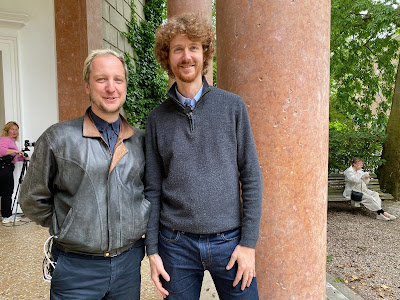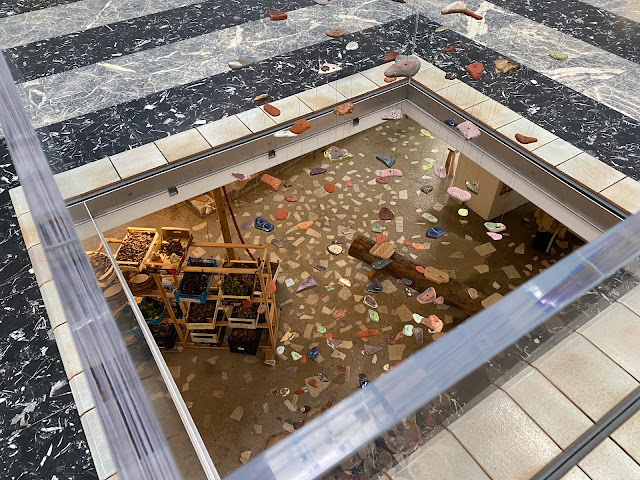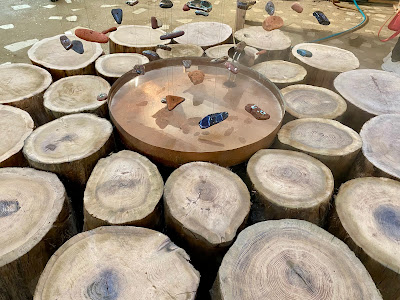Belgium Pavilion
In Vivo
Curators: Bento and Vinciane Despret
Exhibitors: Bento and Vinciane Despret with the collaboration of Corentin Mahieu, Juliette Salme, Corentin Mullender, PermaFungi, BC materials, Sonian Wood Coop
Exhibitors: Bento and Vinciane Despret with the collaboration of Corentin Mahieu, Juliette Salme, Corentin Mullender, PermaFungi, BC materials, Sonian Wood Coop
How can we rethink architecture in a world of finite resources? It is urgent to rethink production itself, which is still too often considered in the context of an extractivist policy. It is also urgent to invent new ways of living. We propose to experiment with enviable alternatives for our territories and our cities, alternatives that would be forged with and from the living - an alliance with mushrooms, which can constitute a highly available, sustainable, renewable material.The In Vivo Pavilion offers a time and a place for critical thinking, particularly because questions of responsibility, of taking other beings into account, and of justice will be discussed in relation to living and building. But its strength will be defined above all by concrete and inventive proposals for an enviable future of living.
Charles Palliez and Corentin Dalon
Belgium Pavilion
Ball Theater
Curators: Muoto and Georgi Stanishev
The Ball Theatre is an installation designed to reawaken our desires for utopia. Its hemispherical shape elicits multiple images. It can be interpreted equally as a terrestrial globe or as a mirror ball, a kitsch icon of an era when partying was still possible. This party aura suggests a new approach to today’s crises, one in which the emphasis is no longer on emergency, but on the possibility of alternative futures. This is enacted in the theatre for the duration of the Biennale Architettura 2023 by an alternation between moments of contemplation and immersion in a landscape of sound echoing with foreign and far-off voices, and periods of intense occupancy in the form of variations on the theme of the ‘ball’, an interplay of workshops– residences between artists, researchers, and students.
Tata Foxie
France Pavilion
Ball Theater
lead curators France Pavilion
Costal Imaginaries
Curator: Josephine Michau
Exhibitors: Schonherr Landscape Architects, David Garcia, Giacomo Brusa Cattaneo, Laurits Sporon Boving Genz, Dejle Zaradesht Mohamad, Iisa Eikaas, Katrina Wiberg, Anna Aslaug Lund Christian Friedlander
Coastal Imaginaries is an exhibition of nature-based design solutions in an age of human-based environmental destruction, as well as a training ground for emerging ecological imaginaries addressing the current crisis of the coastscape. The exhibition offers a catalogue of proposals for a coastal future grounded in seven nature-based principles, addressing the perspective of the urgencies of floods and storm surges. Beyond being mechanisms of resilience, these strategies can serve as CO2 sinks, foodscapes, material banks, and spaces for human recreation and more-than human habitation. Offering a way to (re)synchronise with nature, the septet of principles opens up a new re-enchantment with natural ecologies through changing practices within the architectural profession.
Christian Friedlander - Mermaid Bay Installation
curator, Josephine Michau and exhibiting artist + exhibition designer, Christian Friedlander
Denmark Pavilion
Costal Imaginaries
Architecture, a Place to Be Loved - When Architecture Is Seen as a Living Creature
Curator: Onishi Maki
Exhibitors: Hyakuda Yuki, Tada Tomomi, Harada Yuma, dot architects - Ienari Toshikatsu, Doi Wataru, Ikeda Ai, Miyachi Keiko - Moriyama Akane, Mizuno Futoshi
Exhibitors: Hyakuda Yuki, Tada Tomomi, Harada Yuma, dot architects - Ienari Toshikatsu, Doi Wataru, Ikeda Ai, Miyachi Keiko - Moriyama Akane, Mizuno Futoshi
Even after the pandemic, when the importance of coexistence is reconsidered, faceless developments continue to overtake the city. In such a world, do we have grounds to believe that architecture is loved today? Architecture, a place to be loved, is possible when architecture encompasses its engraved memories and stories and embodies the backdrop and the activities that took place, giving the architecture a broader meaning. It is also possible to perceive architecture as a living creature, rather than an entity separate from nature. The members of our team have many different specialties: textiles, ceramics, photography, design, editing, and architecture. Through the Japanese pavilion we create a spatial experience that invites visitors to think about architecture as a place to be loved.
















